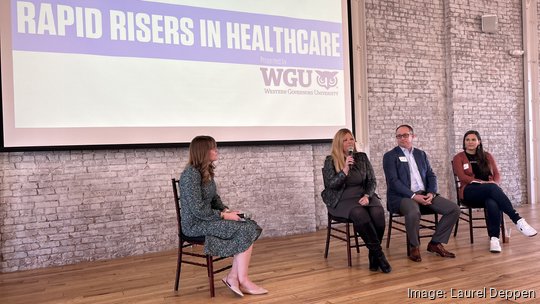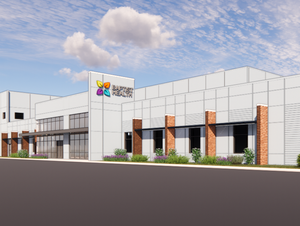
Scaling a company for growth, without stopping the crucial work it's providing, is a major challenge for rapidly growing health care technology businesses.
In the Louisville region, several medium-stage companies are solving problems in the health care industry while balancing growth in terms of revenue and employees. A few were highlighted during the Health Enterprise Network’s “Rapid Risers in Healthcare” event Wednesday.
The Health Enterprises Network — or HEN — works to foster the ecosystem of health care companies in the city. It’s the health care arm of Greater Louisville Inc., Louisville’s chamber of commerce.
Enhancing Louisville’s position as a health care hub has been a key focus of economic development professionals and health care leaders alike. The city is home to large giants like Humana Inc. and health tech startups. This event was meant to recognize the companies in between.
Wednesday’s panel featured leaders from three health tech companies with Louisville ties: Brian Holzer, CEO of Aware Recovery Care, Kim Farley, COO of eBlu Solutions, and Julia Regan, CEO and co-founder of RxLightning.
It was moderated by Haley Cawthon, Louisville Business First’s assistant managing editor who previously covered the startup and entrepreneur ecosystem in Louisville for KY Inno.
Each of these companies have experienced significant growth in recent years and plan to continue. These companies being based in Louisville benefit the city, said Logan Gatti, director of HEN.
“We focus very much on our large companies and startups — brand new, right at the early stage, first dollar,” Gatti said in an interview with Business First. “Some of those companies that are entering that growth and maturation stage often get overlooked. I think it’s really important to focus on these companies … that’s where you’re going to see a lot of growth in terms of new jobs in the city in the near future.”
“… We’ve seen companies leave the region because of a lack of talent, lack of workforce, a lack of general community support. I don’t want any of these companies to leave. Them being here is a huge benefit for us as a community and for us to live up to the moniker of being a health care hub within the region. If we can’t support companies like these, then we’re not doing the work that we need to do.”
What spurred the companies’ growth?
For Aware Recovery Care, the company benefitted from switching from a fee-for-service model to a bundled payment model.
Aware is an in-home addiction treatment company. It’s in 10 states, including Kentucky, and intends to add two more this year. Seven years ago, the company had 50 employees and 100 clients. Today, it employs 800 people and will treat 4,500 people this year.
The treatment Aware offers is yearlong. When it was fee-for-service, the treatment would cost about $45,000, which Holzer said wasn’t scalable. Now, with bundled payment with insurance, Aware is able to treat more people.
“The problem we have here is we're driving the highway at 60 miles per hour and trying to change the tires without having the chance to stop the car,” Holzer said. “That's a very common issue that faces these companies that are going through this meteoric growth. How do you bring the right people in the processes of follow the platforms all at the same time?
“In our case, the demand is not the problem. Unfortunately, this is an epidemic. It's only growing. We can't slowdown in order to fulfill our mission.”
Over a three-year period, eBlu Solutions saw a 359.9% revenue growth, ranking it seventh on Business First’s fastest-growing private companies list. eBlu is a single-portal software solution to verify benefits for specialty medications.
Farley attributed eBlu’s growth to a commitment to scalability from the leadership team and hiring the right people. Still while growing, Farley said it was important to maintain a good culture. It even hired a culture manager to keep the focus key.
With many health care companies in Louisville, specifically jobs in the development space, the company faces competition when hiring. That’s where culture comes in.
“It's just bringing in the right people, making sure you have the right folks to help move your company forward,” Farley said. “And also coming together and working out what you're going to work on, and how we're going to get there with the plan.”
RxLightning is a software-as-a-service (SaaS) platform for specialty medication that allows patients to get their medications faster. The company was launched in early 2020, and now has about 38 employees. This year, Regan hopes to double that figure.
Regan attributes the rapid growth of her company to trends happening the specialty medicine space: the segment itself is growing rapidly and it’s a space that needs innovation.
Why Louisville?
eBlu is committed to Lousiville, Farley said. She thinks capitalizing on the talent the company already has and their connections helps the company integrate into the community. Those relationships help bring new people to the company.
Though Aware isn’t based in Louisville, Holzer is, and it’s the headquarters for the region. He said the city is gem and has a good environment for growth in the health care space.
Holzer doesn’t anticipate Louisville to grow to the level of other larger companies due to a larger number of universities or professional sports teams, but he thinks this is a good thing.
“I think that’s what brings the charm. Keep the charm here,” Holzer said. “… This is a great place to start a company with affordable access to quality of life that will attract workers. Every city around us is busting at the seams, that's quickly becoming unaffordable. I think there's going to be a natural proclivity of folks that want to move from a Nashville to Louisville because the cost of living is half and they can have interesting, quality opportunities that will organically start to grow here.”
How could Louisville improve to better foster health tech companies?
Creating more methods of incubating startups in the city could improve the health tech ecosystem, Regan said. She said the city has some resources and grants, but if an incubator could take a step further to help with consulting founders, specifically those making the leap from a corporate entity, she said.
Farley affirmed that programs for startups that already exist help them focus on a sales pitch and marketing. She hoped in the future there would be programs that could help companies with legal and accounting work and other things that aren’t as obvious.
Now is the best time for Louisville to focus on finding ways to support these companies, Gatti said.
“It’s about companies either exiting or failing,” Gatti said. “There was significant access to capital in the pandemic, everyone was throwing money at all these different projects. Now that's starting to dry up, so it's important that we identify new ways to support these companies [including] incubators and consulting support.”











